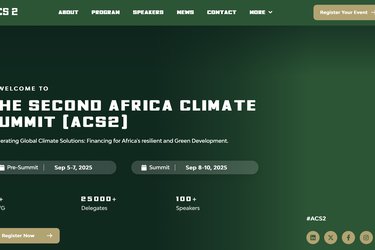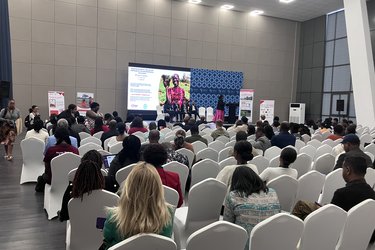
The Second African Climate Summit delivered powerful messages, highlighting interconnected themes in today's Africa's climate landscape. LIFE-AR's participation across various sessions focused on critical areas where immediate action and systemic change are essential for effective climate adaptation and resilience.
This short summary of multiple sessions provides an overview of some of the themes that are relevant for LIFE-AR, focusing on adaptation.
A dominant theme throughout the sessions the team attended at the summit centered on dismantling systemic barriers that hinder effective climate action. Regulatory frameworks remain inadequately adapted, denying access to finance and markets while imposing heavy domestic burdens.
Discussions during various panels revealed that despite numerous existing policies, enforcement and financing remain insufficient across departments and ministries. This pattern repeats at multiple levels, with adaptation financing processes taking up to 10 years and being channeled through non-African entities. The message was clear: structural barriers require systematic solutions that go beyond policy creation to encompass implementation and local ownership.
Multiple discussions emphasized Africa's capacity and readiness to lead global climate adaptation efforts. The continent possesses the knowledge, capacity, and will to lead, with high-level speakers consistently reinforcing that Africa is not awaiting rescue but driving innovations.
Solutions must be designed by Africans for Africans, moving away from the continent being a passive recipient of aid toward actively shaping solutions and innovations . This leadership theme connected directly with calls for country-led and country-owned processes across adaptation planning and financing mechanisms.
As an LDC-led initiative, LIFE-AR fully embodies and supports this perspective. By providing the means to communities to fully select adaptation investments, LIFE-AR pilot countries develop innovative country-owned processes to build resilience.

The financing challenge emerged as perhaps the most urgent theme across sessions. Africa loses 15% of GDP to climate change while requiring more than $500 billion by 2030, yet financing is declining when it should be tripling according to the LDCs call. The stark reality shows Africa receives only 20% of its needs for adaptation.
Panellists, including LIFE-AR Director, consistently highlighted that adaptation finance must be fair, fast, and accessible, reaching the most affected communities - and LIFE-AR Director emphasised its goal of 70% going to local levels . The financing gap extends beyond quantity to encompass quality issues. LDCs and many middle-income African countries are already over-burdened by debt, and there were calls for grants and concessional finance over debt-creating instruments.
In the financing discussion, country platforms emerged as critical mechanisms for mobilizing finance and coordinating actors, serving as incubators for project pipeline development.
The summit highlighted significant gender disparities in climate leadership and technical roles, with women facing systematic barriers including limited access to finance and markets.
However, discussants emphasized women's essential contributions through real lived experiences and intergenerational knowledge. The call for change requires not just policy development but mindset shifts and enabling environments that ensure women's voices are heard in climate action spaces.
In one of her interventions, LIFE-AR Director Tracy Kajumba highlighted the need for coordination, intersectoral policies and inclusion of all voices at community level. She insisted that a whole-of-society approach as implemented by LIFE-AR was fundational for efficient and long term adaptation.
A recurring theme emphasized moving beyond planning exercises to concrete implementation. While 64 National Adaptation Plans exist for developing countries, the critical challenge lies in translating these plans into action. Participants stressed that adaptation is not abstract but practical and transformative, requiring whole-of-society approaches that address community needs holistically rather than through sectoral divisions.
The business case for adaptation includes saving lives, ensuring business continuity, and protecting supply chains, though adaptation's granular nature makes scaling challenging without grants and concessional finance. Early warning systems were presented as crucial practical tools requiring mainstreaming across the continent.
Throughout sessions, speakers called for genuine partnerships based on mutual benefit rather than extractive relationships. The Africa-Europe partnership discussions emphasized the need for value-driven propositions that build capacities and add value at all levels. This theme connected with calls for global solidarity to address what was described as a global crisis requiring collective response. During the discussion, Tracy Kajumba mentioned that Europe could support LDCs by providing long-term, patient finance to strengthen resilience.
COP30 emerged consistently as a critical moment requiring international commitment to triple adaptation finance by 2030. Clear messages were delivered to developed countries about honoring commitments and obligations, particularly regarding adaptation finance doubling pledges made in Glasgow.
The summit's overarching message emphasized that Africa's climate challenges represent global opportunities for innovation, partnership, and sustainable development when approached with genuine commitment to equity, accessibility, and African leadership.